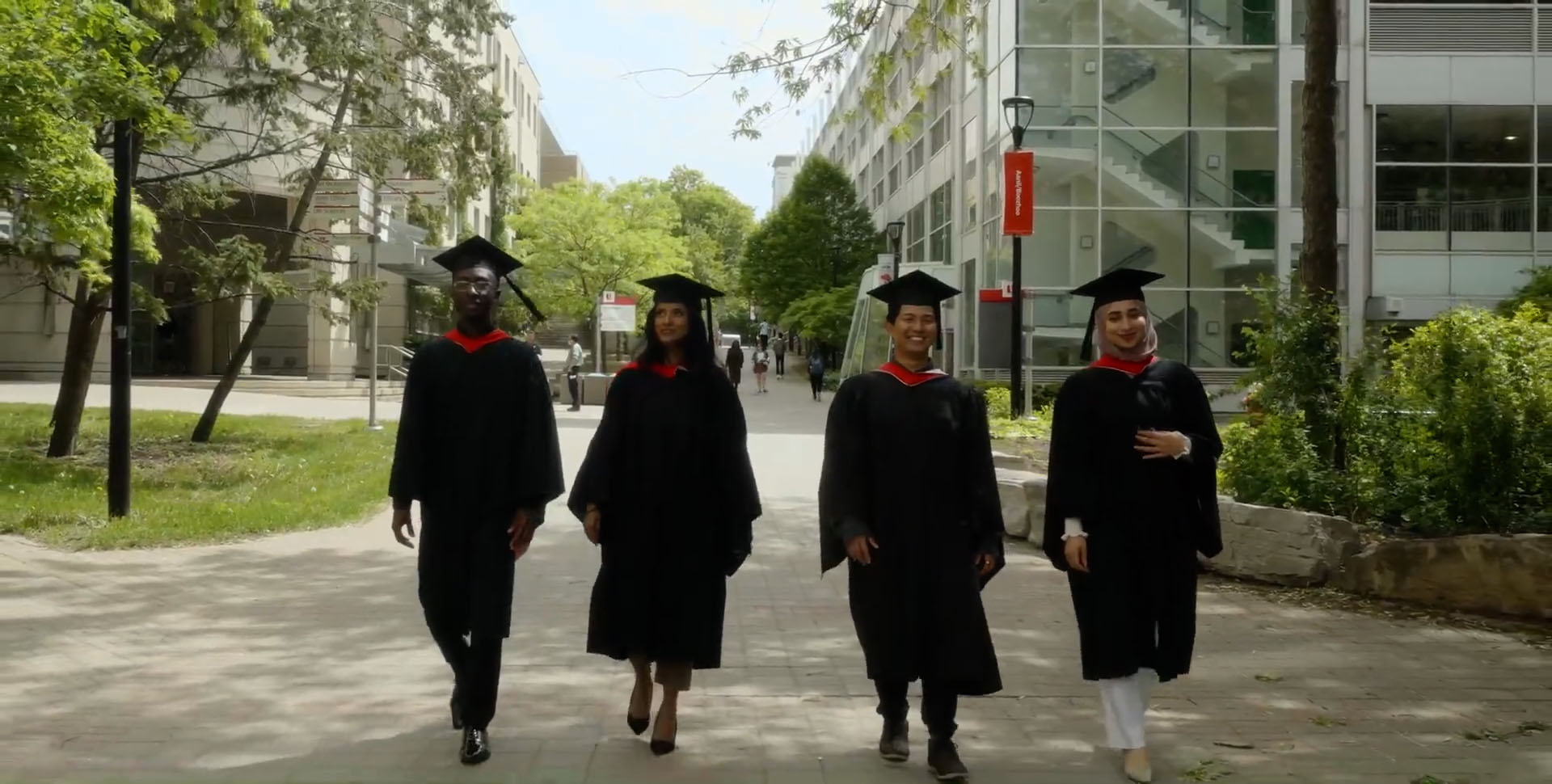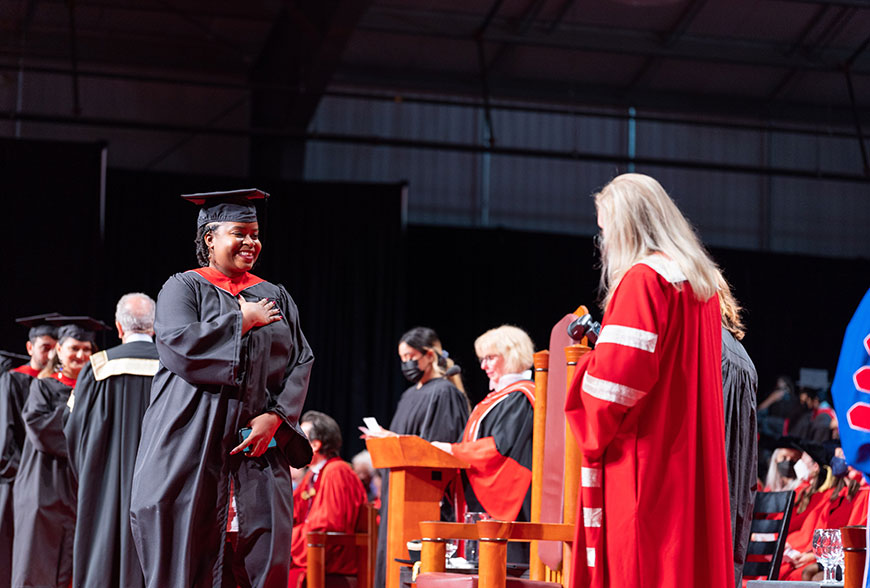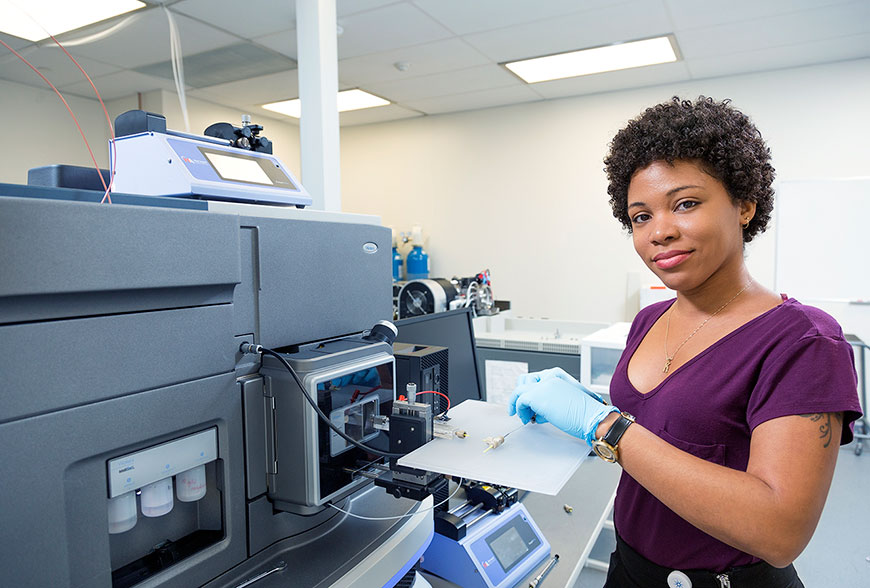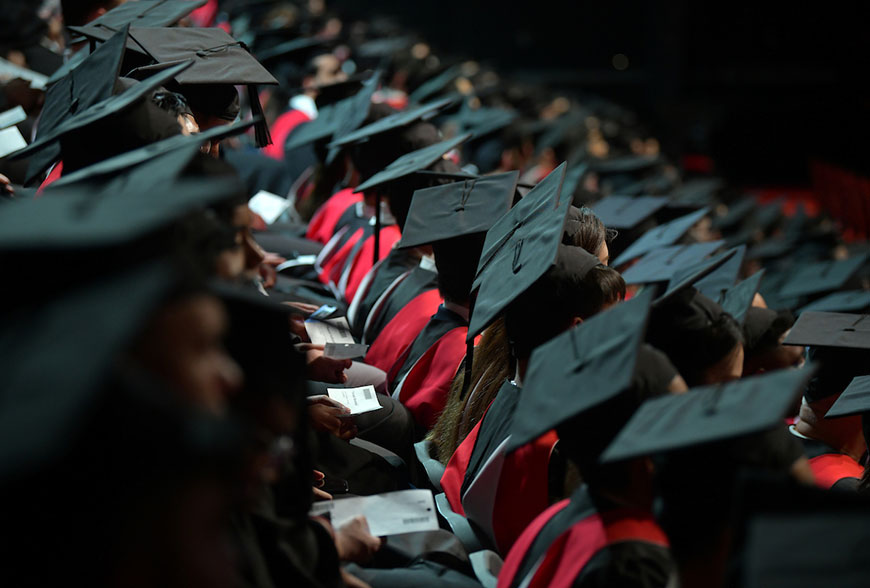Education remains a fundamental human right according to UNESCO and quality education is an SDG cited by the United Nations, but many students around the world still face barriers to accessing and succeeding in education based on their sex, sexuality, race, religion, age and ability.
The pandemic served to exacerbate these challenges for students around the globe. As one of the largest universities in Canada with a broad and increasingly diverse sociodemographic of students, York is committed to addressing barriers to access and promoting opportunities for long-term success while giving a voice to different perspectives, cultures, and ways of knowing and being that will inspire creativity, drive innovation, and right the future for us all.
101%
Exceeded targets for Doctoral enrollments by 101%.*
* York came very close to meeting targets for Full Year FFTE (99%) and Master’s (95%) despite the global pandemic.
$8M
allocated in undergraduate bursaries and scholarships to support international students.
$48.8M
provided in undergraduate bursaries and scholarships.
$800,000+
spent to support mental health and well-being of students in 2021-22.
Black students at York now have additional supports that begin with their transition to the University and extend throughout their undergraduate careers.
The Black Excellence at York University (BE YU) program is designed to champion the academic, professional and personal success of York’s Black student community by offering services and resources to empower Black students as they explore future possibilities. For example, those new to campus can take advantage of the Student Success Centre and its online sessions, peer mentorship and learning skills workshops to support navigation in post-secondary education spaces.
Students also have access to special programs aimed at increasing financial supports; access to programs that focus on increasing leadership capacity, connection and social impact; and access to resources such as walk-in counselling, peer consulting and workshops, and more.
SDG10: Reduced Inequalities
York continues to recognize civically-engaged students and alumni who are righting the future and making meaningful differences in their communities through volunteerism, the arts, academia, business and social advocacy.
At the grassroots level, York encourages peer-to-peer recognition for community contributions and personal achievements through ceremonies such as the Glendon Campus 2021-22 Student Engagement Awards.
At the institutional level, the University celebrates York talent through all campuses and faculties, from Creative Writing Program Awards ceremonies — sponsored by the President’s Office and the Faculty of Liberal Arts & Professional Studies — to awards such as the Barbara Godard Prize, recently granted to a Ph.D. graduate from York’s School of the Arts, Media, Performance and Design.
In 2021, new initiatives were launched to further celebrate and empower the York community. The Top 30 Alumni Under 30 program recognized distinguished alumni who are driving positive change both locally and globally.
TOGETHER, an international venture competition hosted by Schulich and Startup India, allows undergraduate and graduate students in Canada and India to build a network of entrepreneurial peers and over 200 mentors. In TOGETHER 2022, Lassonde and Schulich students won first-place prizes. The inaugural Sustainable Development Goals (SDGs) in Action Student Challenge facilitates interdisciplinary and cross-institutional collaboration between students to design innovative SDG action projects.
SDG4: Quality Education
For a second consecutive year, the Ontario Ministry of Education has provided funding to the Lassonde School of Engineering’s Kindergarten to Industry (K2i) Academy for a summer work-study program for racialized high school students. The $1 million grant for 2022 doubles the province’s investment from 2021 for Bringing STEM to Life: Work-Integrated Learning.
The 2022 program focuses on subjects such as physics, which has disproportionately low enrolment among racialized students, and Indigenous Engineering, Technology, and Innovation in Design. The program will be taught by teachers from four partnering school boards with the support of the Lassonde Research Faculty and undergraduate STEM and STEM-related mentors.
The program is free to participants and is designed to further k2i’s commitment to addressing systemic racism, discrimination and inequality in education by providing more equitable opportunities in STEM fields.
SDG10: Reduced Inequalities
The Executive Education Centre at York University’s Schulich School of Business joined forces with the Rexdale Women’s Centre and the Working Women Community Centre to create and run the Digital-Age Project Management Skills for Newcomer Women project.
The new initiative was designed to prepare recent newcomer women seeking jobs and incumbent workers who were disproportionately affected by the COVID-19 pandemic to enter or re-enter the Canadian workforce. The program will provide training for up to 80 women in core digital competencies and project management skills that will enhance their professional competencies.
Participants will receive their educational certifications from Schulich ExecEd — a prestigious program that ranked 32nd in the world and 2nd in Canada in the 2022 Financial Times rankings — and have access to additional employment supports. The project is funded by the Ontario government’s Skills Development Fund.
SDG10: Reduced Inequalities
Camerise, a thriving new knowledge hub at York’s bilingual Glendon Campus, is providing students, educators and administrators in Canada’s FSL community with a digital platform of resources and tools rooted in the Open Science Framework (OSF). The OSF is a web application that is used for data sharing, open access and open education and that promotes a culture of sharing of scholarly, pedagogical resources and tools.
The hub is directed by three co-leads, Professors Muriel Péguret and Dominique Scheffel-Dunand and researcher Mirela Cherciov. The trio developed Camerise in response to a call for applications by Canadian Heritage and the Ontario Ministry of Education to help address the recruitment and retention of FSL educators.
Camerise, in English, is the haskap berry, an indigenous berry that thrives in boreal climates, grows in clusters, and is now cultivated in Canada for its nutritional value. The hub aspires to make similar contributions in terms of vitality and evolution – and foster an ever-blooming community of practice around FSL. The hub is already on its way to achieving its objectives through the launch of its second prototype.
Now at the beginning of its third year, Camerise is working on its third prototype and is looking for ways to become self-sustaining.
SDG4: Quality Education
Since launching the Advancing YU mentorship program in 2021, York’s Faculty of Liberal Arts & Professional Studies has been helping prepare women and Black students to enter the workforce.
The unique program matches select alumni who are achieving success in their chosen fields with third- and fourth-year Black and/or women students in need of mentorship and skill development in areas such as interviewing and resume writing. In its pilot year, 138 students and 46 mentors took part in Advancing YU.
The Advancing Black Students stream, which had 78 students and 26 alumni mentors, recognizes the importance of a program that helps redress historical shortcomings in mentorship opportunities. The program celebrates the many successful York University Black alumni and provides them with opportunities to meet and invest in the next generation of Black professionals and scholars.
SDG10: Reduced Inequalities
The Top Scholars Program was launched to attract and encourage talented high school students to pursue their graduate studies and is key to York’s UAP priority, From Access to Success, in demonstrating York students achieving their potential.
In 2021, five students were recognized through the McCall MacBain Scholarship Program which offers academic and leadership support for exceptional students who strive to engage in positive change by taking on meaningful leadership roles. Included in that list was Amanda Sears, a top scholar from Glendon College who served as editor-in-chief of Pro Tem, Glendon’s bilingual student newspaper.
The McCall MacBain Scholars are connected with mentors to participate in an interdisciplinary leadership program while pursuing a fully funded master’s or professional degree at McGill University.
SDG4: Quality Education
Learn more about our priorities:







